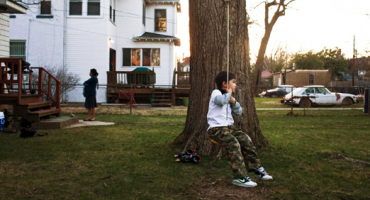Five Ways to Help Elder Caregivers with an Alzheimer’s Spouse
- Be sensitive to how the Traditionalist Generation thinks.
- Help elderly caregivers let go of the person they knew.
- With the therapist’s help, identify the kinds of support elderly caregivers need.
- Forge a circle of support for caregivers, with friends, family, and groups.
- Remind elderly caregivers to be proactive in every area, especially with their safety.
When an Elderly Caregiver Has an Alzheimer’s Spouse: Alternatives to Toughing It Out
Nettie, 76, was reluctant to have her daughter call the therapist. But her daughter was insistent.
Nettie, who had been married for 50 years, was struggling with how to cope with her husband’s Alzheimer’s. She was not doing a very good job at it. Nettie was focusing only on her husband, Sam, and neglecting her own well-being.
Nettie was from the Traditionalist Generation—also known as the Greatest Generation, born between 1922 and 1945—and she took her vow, “in sickness and in health, till death us do part,” literally. This strongly held value about marriage left no room for her own health. Her sole responsible was for Sam’s care.
She took her vow, “in sickness and in health, till death us do part,” literally. This strongly held value about marriage left no room for her own health.
As a Traditionalist she was silent about her needs and did not share her feelings or the challenges that she faced. She was private. Because of this, though, she struggled with Sam alone.
Traditionalists don’t tell others their experiences about their loved one. Or if they do, they minimize how much their loved one has deteriorated, but are quick to add “You have no ideas what I dealing with on a daily basis.” Nettie would pull the “martyr” card like this when she spoke with her friends and family.
Coming to Terms with the “Loss”
Statements like hers are common because elderly caregivers can be plagued by the issue of ambiguous loss—something they commonly experience when their life partner is still alive physically but not all there mentally.
The person they’ve known all their life is gone, and there’s uncertainty how they will be each time the caregivers interacts with them.
- Will they remember who I am?
- Will they be agitated by my presence?
- Will they let me take care of him?
- Will they be nonresponsive or suddenly accuse me of having an affair or stealing their money?”
“Having to constantly consider these kinds of questions can be devastating for well spouses, who often report that they feel like they’re on a roller coaster,” said geriatric clinical social worker, Nancy Kriseman. “Therefore, therapists should try to discover whether their elderly clients are experiencing ambiguous loss, and if so, they should name it and explain what it means and how it can affect them, giving them permission to express their sadness and grieve these losses.”
Letting Go of the Person You Knew
Elderly clients need help in finding new ways to accommodate themselves to their losses. In Nettie’s case, she was holding onto the old Sam, as she called him, expecting him to communicate the same way. She needed to understand that because his frontal lobe wasn’t functioning—due to the Alzheimer’s—she should stop trying to reason with him.
“I’ve found that elderly clients experience great relief once they grasp how common ambiguous loss is and have the opportunity to express their feelings,” Kriseman said. “This, in turn, helps them recognize why they feel so stressed and anxious.”
It can be hard to let go . . . really hard, as Nettie learned. The Traditionalist Generation tends to believe they simply have to cope with whatever comes their way, so it’s critical for therapists to remind elderly clients to be proactive in every area of their lives, especially with their safety.
It’s critical for therapists to remind elderly clients to be proactive in every area of their lives, especially with their safety.
Nettie learned this lesson the hard way. But she was able to avoid a potential tragedy when she disarmed Sam who had found one of his old hunting rifles in the closet. Fortunately, it wasn’t loaded. She shuttered at the thought of the weapon’s magazine being full, though, and immediately removed it from the house.
Additionally, Nettie took precautions against Sam’s growing combativeness, and kept her cell phone on her at all times. That way, if she ever felt threatened, she could quickly call 911.
“If there’s an alarm system in the house, remind them they can use the panic button,” Kriseman said. “Also, therapists can encourage elderly clients to speak to their spouse’s physician for support.
But Nettie couldn’t do so originally because she was stuck in the belief that she must tough it out by herself with no help. It never crossed Nettie’s mind to seek out professional help for herself.
“I’m fine, and I don’t need anyone to tell me otherwise,” she said to her daughter.
Asking the Younger Generation to Take Charge
Her daughter knew better. She could see her mother’s strength waning, and her irritability increasing, to the point where she could not stop yelling at Sam for doing “such stupid things.”
“He can’t remember anything, and I can’t take my eyes off of him for a moment or he will burn himself on the stove or open the front door and go, who knows where,” she told her daughter.
Then there was Sam’s cursing at Nettie. He was also hitting her mostly at night when she was trying to get him ready for bed. Once, to Nettie’s horror, he removed his clothes in public, and defecated right there in the restaurant.
He was also hitting her mostly at night when she was trying to get him ready for bed. Once, to Nettie’s horror, he removed his clothes in public, and defecated right there in the restaurant.
Sam was becoming more physically, emotionally, and verbally abuse toward Nettie. These issues were physically and emotionally depleting for her, as well.
Overwhelmed but afraid to admit it, Nettie refused to acknowledge what she could and couldn’t do when it came to Sam’s care, or her own. She desperately needed help in setting limits.
How to Move Past, “I Don’t Need Any Help!”
“Traditionalist spouses often need help identifying what kinds of support they need, such as getting a family member to come over for a few hours so they can run errands or do something by way of self-nurture,” Kriseman said. “They need to be reminded that ‘sharing the care’ can provide a positive benefit for the ill spouse as well.”
This includes forging a circle of support—friends, family, and colleagues willing to help both the caregiver and spouse. Therapists should also explore whether there might be other ways to help nourish the spouse’s spirit.
For example, with the therapist’s help, Nettie decided to enroll in a tai chi class, set up a weekly lunch date with her daughter, and join an Alzheimer’s support group. These activities are easing the denial about her own limitations, and she’s also much better planning for Sam’s care.
However, none of this would have happened if Nettie’s daughter hadn’t sought help for her mother. Tired of the repeated “I’m fine; I can handle it” statements, she got her mom into counseling, driving her to the first few appointments, just to make sure she would go.
Tired of the repeated “I’m fine; I can handle it” statements, she got her mom into counseling, driving her to the first few appointments, just to make sure she would go.
Though no therapist herself, Nettie’s daughter knew more than her mom did that therapists can make a huge difference in helping penetrate the veil of silence that often shrouds the grueling struggles of day-to-day care for elderly caregivers. Kriseman agreed: “It’s important never to underestimate how validating and normalizing the caretaker’s experience—especially the underlying embarrassment, guilt, and sense of helplessness—can foster resilience and inspire hope, counteracting the terrible sense of isolation that too often adds to the seemingly all-consuming burden of looking after Alzheimer’s sufferers.”
Reference
Kriseman, N. “Breaking the Isolation of Caretaking: Three Ways to Help Clients Cope with the
Challenges of Alzheimer’s” (September 28, 2016). Psychotherapy Networker. Retrieved
from https://www.psychotherapynetworker.org/blog/details/622/breaking-the-isolation-of-caretaking




